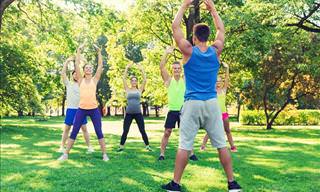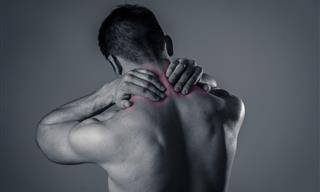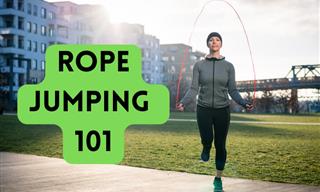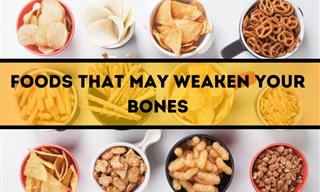1. Know Where You Stand

If you’re not sure where you stand on the bone-strength scale, head to your doctor’s office for a couple of helpful tests.
One such test is the software program FRAX (Fracture Risk Assessment Tool), which was developed by the World Health Organization to help your physician calculate your probable osteoporosis risk over the next decade. It does this by assessing your lifestyle, health, risk factors, and genetic history.
However, the most accurate test is the bone-density test, also known as a dual-energy X-ray absorptiometry (DEXA) scan, which you should get when you reach menopause. During this simple and noninvasive test, the patient lies on a padded cushion as the screening device beams low-dose X-rays onto the hips and spine to measure bone-mineral density.
The patient will then get a “T score” that compares her bone density with women in their 30s, when bone strength is at its highest. A T score of +1.0 to -1 indicates normal bone-mineral density, a score of -1 to -2.5 indicates osteopenia, a condition in which bones are less dense than normal, and a score of -2.5 indicates osteoporosis.
2. Bone up With Calcium
Your bones store up to 99% of the calcium that your body needs for every function, including blood clotting, and muscle and nerve function. Women can lose up to 20% of their bone density during the 5-7 years after menopause due to a decrease in estrogen.
How this hormone strengthens bones isn’t entirely clear, but a study carried out by the University of Buffalo in 2007 found that it may maintain bone density by preventing an enzyme called caspase-3 from triggering the death of osteoblasts, cells that help grow new bone and teeth.
Therefore, this is why women over the age of 50 should get about 1,200 milligrams of calcium a day. Your best sources of calcium include low-fat and fat-free dairy products such as milk, cheese, yogurt, and ice cream.
However, it’s important that you don’t overdo it as too much calcium – more than 2,500 mg for adults 19-50, or more than 2,000 mg if you’re over 51 – can lead to constipation, kidney stones, and it can interfere with the body’s ability to absorb essential minerals such as iron and zinc.
3. Get More Vitamin D

If women don’t get enough vitamin D, they could lose up to 4% of their skeletal mass every year. This is why it’s vital to increase vitamin D intake. It helps to maintain calcium levels in the bones and aids in absorption.
You can get vitamin d from leafy greens and fortified dairy products, but the major source is sunlight, which triggers the production of this vitamin in your skin. Therefore, if you live in a cloudy climate, you’ll probably need to take some vitamin D supplements.
Many doctors believe that women over the age of 50 need 2,000-3,000 international units of vitamin D per day.
4. Eat Your Veggies
Fruit and vegetables have high levels of nutrients essential for skeletal health, such as magnesium, potassium, vitamin C, vitamin K, and several B vitamins.
Magnesium helps cells to absorb calcium, vitamins C and K regulate the enzymes responsible for strengthening bone, and B vitamins help cells to regenerate.
According to a study carried out at the Clinical Research and Regional Bone Centers at Helen Hayes Hospital in West Haverstraw, New York, five servings of fruit and vegetables each day is all you need.
5. Kick Butts
According to a study which was carried out on 4,332 women at the Universidade Federal de Sao Paulo in 2007, Smoking leads to bone loss and fractures in women older than 40.
Nicotine has toxic effects on bone-forming cells and lowers estrogen levels, which reduces bone density and leads to earlier menopause.
6. Drink Moderately

If you drank a lot of alcohol during your teenage years, you may have irreversible skeletal damage and a greater risk of future fractures and osteoporosis.
When researchers exposed adolescent rats to the human equivalent of binge drinking (four drinks on one occasion) thee days in a row, more than 300 genes responsible for bone formation and bone-mass maintenance were disrupted. This damage was long lasting too.
However, according to a 2009 study published in The American Journal of Clinical Nutrition, moderately drinking 1-2 glasses of wine a day can actually protect bones, especially if you’re postmenopausal. Researchers theorize that moderate drinking may affect estrogen concentrations or suppress bone breakdown to release minerals used in the rest of the body.
7. You Really can be Too Thin
Having a little extra paddle can help to protect your bones as a low body weight often goes hand in hand with low bone mass and an increased risk of fractures. In fact, a 10% weight loss results in up to 2% bone loss.
Fat is associated with bone-building hormones, such as estrogen, and when you lose weight, circulating estrogen starts to decrease.
Source: lifescript
Images: depositphotos
Related Articles:
12 Fantastic Fat-Burning Foods
7 Healthy Food Combinations
Are You Low in Calcium?
If You Feel That You're Lacking in Iron, Eat These Foods
 Go to BabaMail
Go to BabaMail



























